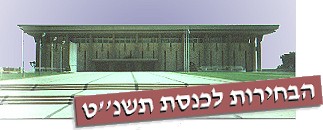Monday, May 03, 1999
'Riffraff' slur hurts Labor
leader in Israeli election campaign
Likud raps actress' remark against Sephardic voters
Joel Greenberg
/
The New York Times, with files from Agence
France-Presse

JERUSALEM - Entering its home stretch, Israel's volatile
election campaign generated fresh controversy yesterday with the broadcast
of remarks that had the ring of an ethnic slur. An actress who supports Ehud
Barak, the leader of the Labor Party, called working-class Sephardic Jewish
backers of Benjamin Netanyhau, the prime minister, "riffraff," setting off a
storm of protest and damaging Mr. Barak's efforts to capture Sephardic
votes.
The statements by the actress, Tiki Dayan, forced Mr. Barak into
urgent damage control. It also breathed new life into Mr. Netanyahu's
campaign at a time when Mr. Barak had been appearing to open up a lead
in public opinion polls, a little more than two weeks before the May 17
elections.
The incident exposed ethnic tensions simmering just below the
surface of the campaign, in which Mr. Barak has been reaching out to
disadvantaged Sephardic voters by focusing on issues such as
unemployment and education.
Ms. Dayan spoke on Friday at a gathering of performing artists
who support Mr. Barak, and her remarks were broadcast yesterday morning
on Israel Radio. They touched a raw nerve, exposing social fault lines
that have traditionally divided Labor supporters from backers of the
Likud, many of them working-class Sephardic Jews living in low-income
neighbourhoods and towns.
"We're talking about a different people, don't you understand,"
Ms. Dayan told the gathering, which Mr. Barak attended. "We're talking
about people who've been made into the most important people here, to
the people in the market, to the riffraff, to those who say, 'Even if he
were Arafat I would vote for Bibi [Mr. Netanyahu's nickname].' "
Ms. Dayan added: "That's how they think and that's how they
talk. Speak to them in a way they'll understand -- clear, open,
straight, humble."
Mr. Barak, a former army chief of staff, described the decision
to broadcast the remarks as a "cluster bomb" aimed at his campaign.
Shlomo Ben-Ami, a prominent Sephardic member of Labor, called the
comments "semiracist" and "verbal pornography."
Moving quickly to make up for his failure to denounce the
statements when they were made, Mr. Barak condemned them repeatedly in
radio interviews yesterday and demanded that Ms. Dayan apologize.
Ms. Dayan, noting that she was herself Sephardic and had
portrayed Sephardic characters, said she was sorry for using the term
"riffraff," and she warned against attempts by the Likud to exploit her
statements to fan ethnic hatred.
But Mr. Netanyahu asserted that Ms. Dayan's remarks had simply
shown that Labor remains the same remote, elitist party that has
alienated Sephardic voters for years.
"It's the same arrogant left, the same small group in the
suburbs of north Tel Aviv who think they can run the country," Mr.
Netanyahu said.
Mr. Netanyahu claimed Ms. Dayan had belittled the Sephardic
community -- Jews who originate from Spain and North Africa -- who
traditionally vote Likud and mistrust Labor leaders because of their
failure to help the new immigrants during the 1950s, when they were in
power.
He drew a parallel between Ms. Dayan's remarks and an ethnic
slur used at a Labor party rally in 1981 by an Israeli entertainer, Dudu
Topaz, who called Likud supporters "chakhchakhim," a pejorative
reference to Moroccan-born Jews. Backlash against that epithet is said
to have helped Menachem Begin, then-prime minister, win re-election.
In the latest surveys released on Friday, Mr. Barak's lead rose
to eight points over Mr. Netanyahu, his biggest advance of the campaign.
Mr. Netanyahu reacted by summoning his American campaign
advisor, to Israel, and was expected to launch an aggressive attack on
Mr. Barak during the final two weeks of the race.
|